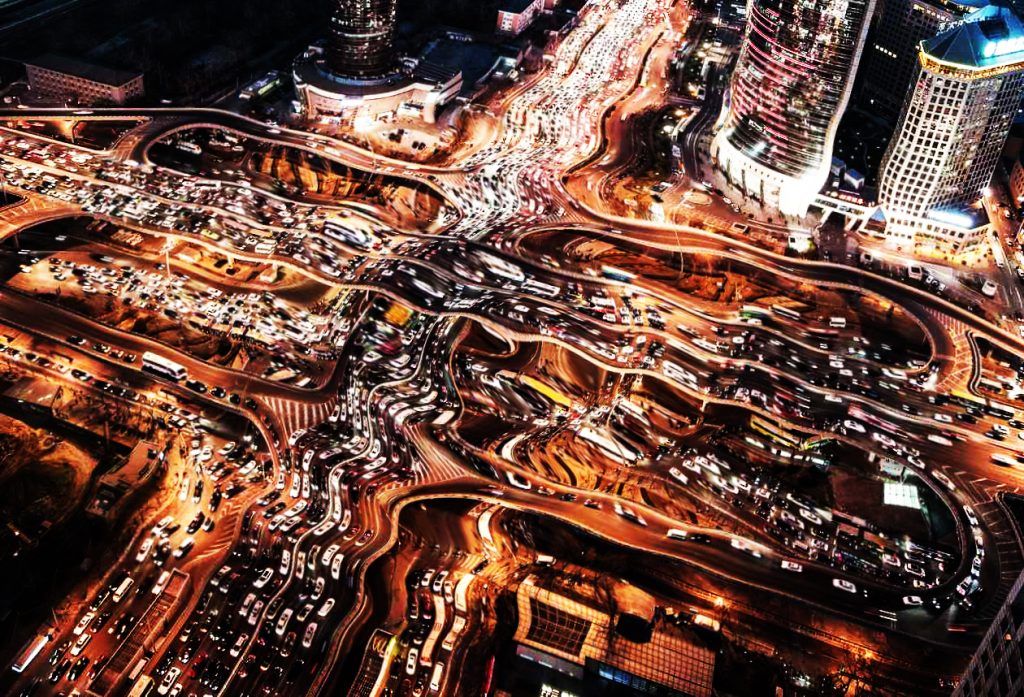
This is a piece I’ve been meaning to write for some time. As the title suggests, it discusses the idea that as society becomes ever more complex, as well as becoming harder to develop any overview of how it functions, it’s also becoming more vulnerable to disruption and eventually collapse. There seems to be a collective blindness towards the fact that we’re living in a rapacious, over complex industrial society whose existence cannot be sustained, simply because we live on a finite planet.
There’s a growing sense we’re on the wrong trajectory. Some have acted upon that, albeit there are questions to be asked about their analysis, strategy and tactics. Given the enormity and complexity of what we face, to be honest, that’s to be expected as we’re all feeling our way in the dark. Others recognise that something pretty fundamental is wrong but zone it out of their lives by focusing down on what’s immediate to them, aided by distraction in the form of ‘entertainment’. Again, understandable given the enormity of what we face.
What this piece is attempting to do is highlight how we’re heading towards a cliff edge and offer a few tentative suggestions as to how we can bring about the radical change required to put us on a more positive course. It’s not a comprehensive overview because quite frankly, attempting that is pretty much an impossibility. We hope it will spark some constructive discussion and debate on where we are and how we can go forwards.
Exposing vulnerabilities
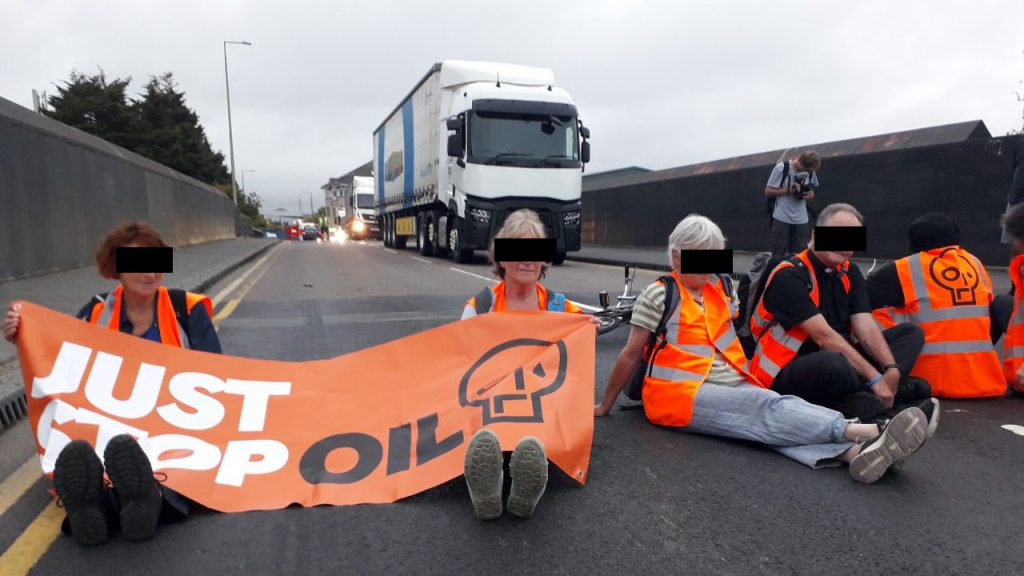
When we were living in Thurrock, we noted with some interest how easily the direct actions taken by Insulate Britain and then Just Stop Oil, brought parts of the borough to a grinding halt: Insulate Britain: Police probe footage of Thurrock protest 19.10.21 and: Two more people arrested at Just Stop Oil protest in Thurrock near illegal tunnels dug under Essex road 31.8.22. Actions that not only disrupted people’s daily routines but also, impacted a number of finely calibrated ‘just in time’ supply chains. It really didn’t take a lot for chaos to ensue from a few simple acts of disobedience. What happened was living examples of the Butterfly effect in action where one small change in one part of a complex system can trigger a multiplier effect having a much greater and adverse impact in other parts of the system.
Before we proceed any further, it should be pointed out that incidents have been bringing the road network in Thurrock to a grinding halt long before Insulate Britain and Just Stop Oil came onto the scene and will continue to do so long after they have departed. These range from road traffic accidents through to the bridge at the Dartford River Crossing having to be closed due to bad weather. The difference is that road traffic accidents and bad weather causing disruption are shrugged off by the motorists of Thurrock as ‘just one of those things’ while intentional disruption by the likes of Insulate Britain and Just Stop Oil provoked anger and dark thoughts of payback.
The intention of Insulate Britain in blocking roads in Thurrock was to draw attention to the urgent need for an insulation programme that would reduce fuel bills and also, the amount of energy used. Suffice to say, while the demand was exemplary, the tactics backfired. The Just Stop Oil actions were aimed at putting pressure on the government to put a halt to any further oil exploration and extraction. Their tactics took in blocking roads by means of occupying motorway gantries and the bridge supports at the Dartford River Crossing and also, blocking access to and from a number of oil terminals in the west of Thurrock.
Taking a step back, whether or not it was one of the intentions of Insulate Britain and Just Stop Oil, their actions did draw attention to how vulnerable complex systems are to disruptive events. We live in an economic, political and social system of immense complexity. One that heavily relies on fragile ‘just in time’ supply chains. Supply chains that when all the elements are in place, work smoothly, albeit it’s always squeaky bum time as the possibility of incidents and events that can disrupt those supply chains is ever present. One event that could disrupt an over complex, fragile supply chain is a sudden shortage of fuel. Fuel shortages can happen for a range of reasons from geo-political machinations through to issues at refineries and oil storage terminals. Once a supply chain breaks down and the shelves start to empty, a kind of panic sets in among the populace at large as they realise that they’re over-reliant on complex systems that no one really fully understands.
So, intentionally or not, it could be argued that the disruption caused by the Insulate Britain and Just Stop Oil activists might actually have done us a favour. Their actions have shone a spotlight on just how fragile and vulnerable the systems we rely upon to supposedly sustain out lives have become. Particularly ones that rely on fossil fuels which are finite. As for sustaining our lives, that’s ‘sustain’ as in keeping us all locked into an over-complex system which is far from sustainable in the long term. That’s definitely not sustain as in making sure we’re the ones in control of our lives, seeking happiness and fulfilment on our terms. It’s most definitely not sustainable when we’re locked into an extractive, exploitative system that fails to recognise that we inhabit a planet whose resources are finite.
Complexity and unintended consequences
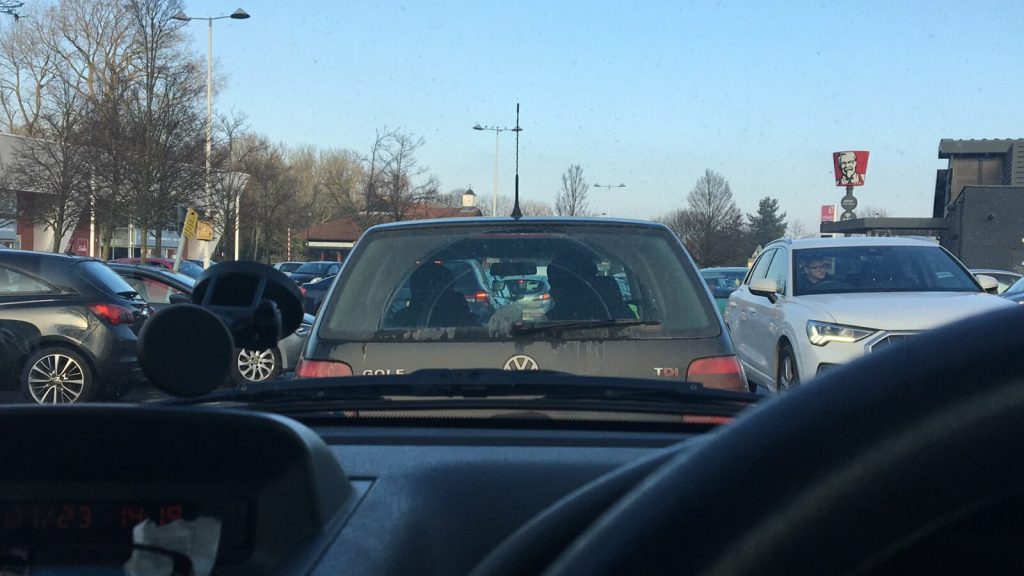
However, you don’t need activists blocking roads and oil terminals to cause chaos as was pretty clear to anyone trying to exit the Eastgate Retail Park in the north east of Bristol on the afternoon of Saturday 21 January: Gridlock at retail park traps drivers for ‘three hours’ 22.1.23. Each of the larger retailers have their own car parks which feed out into access roads that can’t cope with the volume of traffic and frequently grind to a halt. This is chaos that’s down to a lack of joined up thinking when it comes to the supposedly simple task of designing the parking system at a retail park in such a way that it doesn’t snarl up.
With an increasing number of real life face to face interactions being transferred online or digitised, complexity is increased. Getting a doctor’s appointment used to be a simple matter of phoning up your local surgery, speaking to the receptionist and booking a face to face appointment with a doctor. Now it’s increasingly being pushed to having to book an appointment online, often having to download an app in the process, to then end up with a consultation via a video link. With the amount of complexity being built into the process, it’s hardly surprising that older patients not so used to the digital world we’re being forced into simply give up and instead, suffer in silence. With ticket offices at railway stations facing the axe, passengers have the choice of using vending machines on the platform (if they work) or having to go online to download a ‘ticket’ onto their smartphone. From our experience, ‘tickets’ on smartphones always seem to be the cause of delays in getting out of the station at Bath as the barriers often fail to read what’s on the phone! There’s an increasing amount of complexity being forced upon us as a consequence of the drive to digitise as much of our existence as possible. There’s plenty of anecdotal evidence pointing out the problems stemming from this digitisation as a result of poor design and implementation. Now just imagine the chaos that would ensue when hackers mount a sustained attack on these digitised systems…
A lot of what goes wrong in our society can be put down to a lack of joined up, holistic thinking. That’s because the society we live in has grown to be so complex it’s pretty much impossible for anyone to have an overview of how things are supposed to function, let alone how to fix things that go wrong. So, we have a situation where piecemeal measures are implemented to fix issues without any understanding of how they’re supposed to integrate with other piecemeal measures, let alone be part of a cohesive whole. Chaos and the potential for collapse seem to be inadvertently built into modern life…
Evading the stark truth
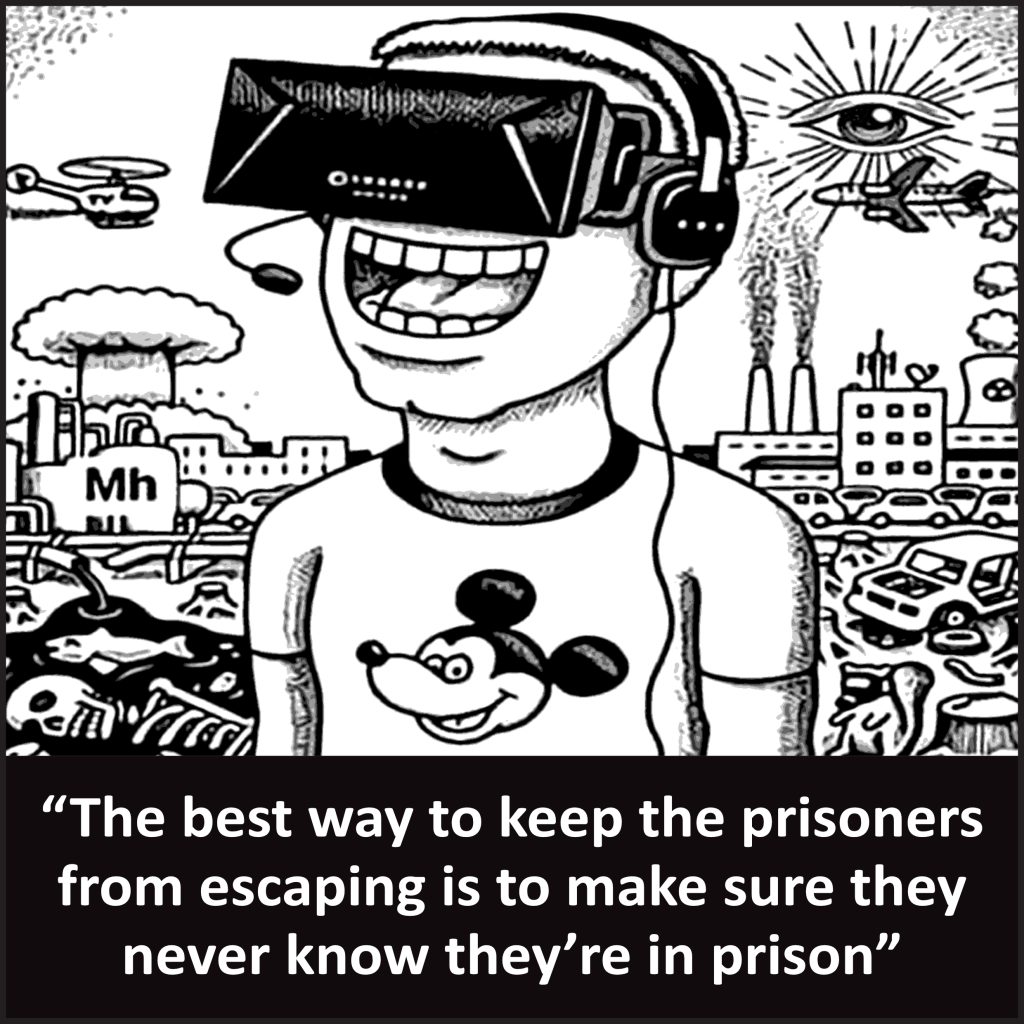
It feels as if it’s a case of heads down, play your role in the system, be grateful for the ‘rewards’ you get and don’t ask difficult questions. There’s little in the way of having a culture of joining the dots, doing some holistic thinking and asking if the system is working for everyone. As soon as the few people able to do the deep digging required realise that the system works for the few at the very top while screwing the rest of us over speak out, they’re vilified and demonised. We have a culture of compartmentalisation. The lack of joined up thinking on a range of issues is a consequence of a culture of compartmentalisation and specialisation. The deeper you get into a specialist aspect of running things, the less likely you are to be able to join the dots and see the bigger picture. Which may well suit the elites seeking to control us while accumulating more of our wealth and resources but, is leading the majority of us towards disaster.
We have a culture of distraction. The ‘entertainment’ we get feels like it’s geared towards escapism. Had a crap day at work and feel that things in your neighbourhood are starting to fall apart? Tune into Netflix for a few hours to forget about the world outside. Which only works until the problems of the outside world start to trash your life. The thing is that when the outside world trashes your life, unless you have the time and energy to undertake your own research, you have to rely on a ‘news’ media that seems to be forgetting the basic tenets of honest journalism. Given the pressures of modern life and the amount of crap people have to deal with, to be honest, it’s not surprising that a lot of people don’t have the time to undertake their own research that would enable them to join the dots and see the bigger picture. We can only manage to do this because we’re retired and actually have the time. The other thing that being our age gives us is a bit of perspective so when we say that things are heading in a pretty disturbing direction, please try to trust us on that one!
The end of the road?
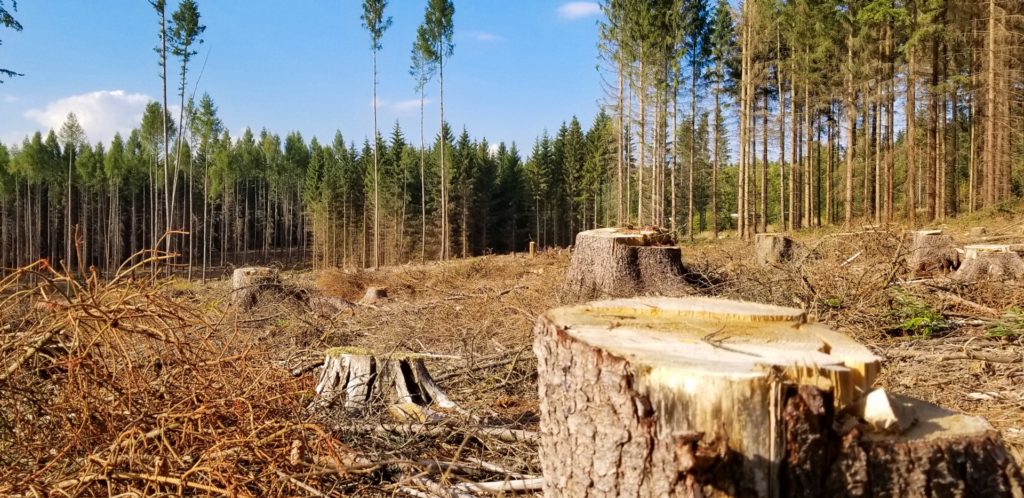
History shows that previous civilisations survived for a good few thousand years. Our rapacious, extractive industrial ‘civilisation’ will not be surviving for anything like that length of time because the resources needed to sustain it will eventually be exhausted. For sure, there’s plenty of debate about just how long the resources we have will actually last with a fair few commentators pointing out that some of the doom laden predictions made back in the 1970s have yet to come true. Okay, the 1970s were weird and pretty doomy so it shouldn’t come as much of a surprise that some of the predictions made at the time reflected the doom laden mood of that decade. We may well have more time than was predicted back in the 1970s before the resources that underpin our lives start to run out. Nevertheless, the stark fact remains that we live on a finite planet and that at some point, sooner rather than later, we need a mature discussion on how we can get off the treadmill and find ways of living that are less materialistic, less exploitative and above all, considerably more fulfilling.
How can we achieve change?
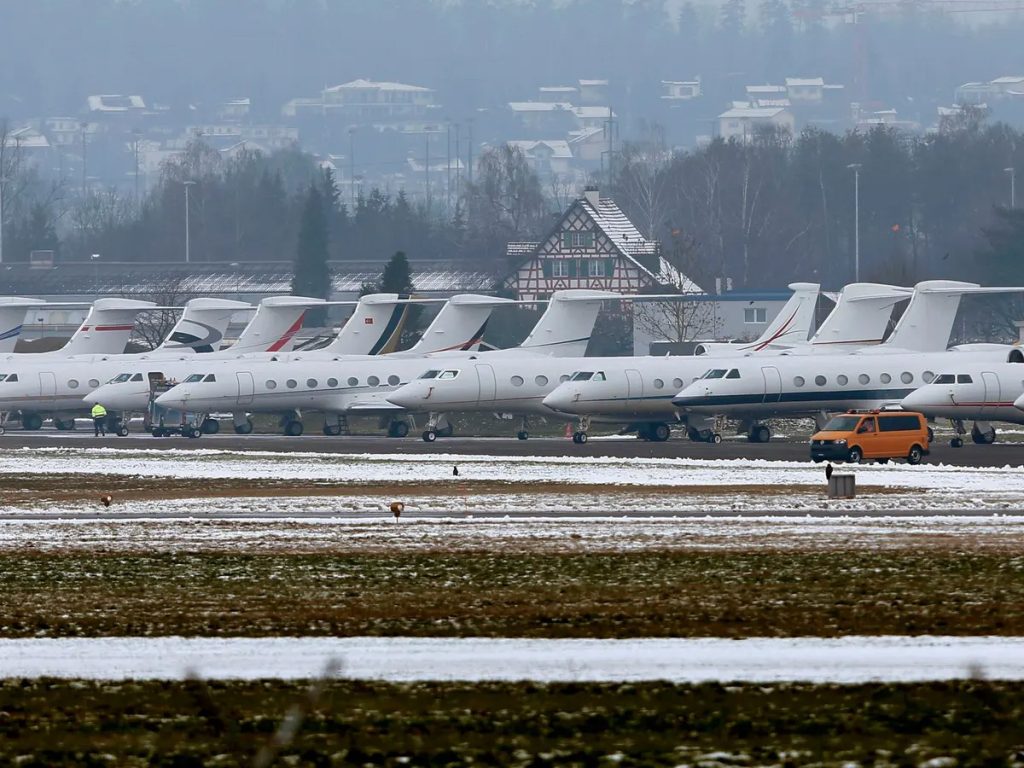
The problem is resolving the question of how we have that discussion, who’s actually in control of it and how do we bring about the changes needed to get our lives on a more sustainable and fulfilling footing? Lectures from attendees at Davos who flew in by private jet, commuted from the airfield where the jets landed by helicopter to get closer to the venue and then swanned around in SUVs ain’t going to cut it to be brutally honest. No one wants to be lectured on reducing their carbon consumption by a bunch of over-privileged hypocrites, do they? Nor do they want top down solutions such as the imposition of so called ‘fifteen minute neighbourhoods’ by dictatorial local authorities. We’ve written a lot about the concept of ‘fifteen minute neighbourhoods’ and how that has been hi-jacked and twisted by those seeking to leverage the implementation of them to impose ever greater levels of monitoring, surveillance and control over us. This is the most recent post we’ve written which we hope explains our take on it: Where we stand on 15 minute neighbourhoods 10.1.23.
Top down solutions cooked up by Davos attendees and those who pull their strings simply won’t cut it. Bear in mind that these people are looking after their own interests and if that means forcibly locking us into constrained, low consumption lives while they continue to swan about flaunting their wealth, they won’t hesitate for a second in doing just that. That’s particularly if they think they can get away with it. The lockdowns imposed to ‘deal with’ Covid were a way for them to test compliance. The level of resistance to the lockdowns which grew as more people realised that Covid was being leveraged to accelerate the imposition of the Fourth Industrial Revolution probably wasn’t something they expected. That spirit of resistance has transferred itself to opposing the top down implementation of ‘fifteen minute neighbourhoods’.
While we strongly sympathise with the resistance to imposed top down measures such as ‘fifteen minute neighbourhoods’ and understand people’s fears about what they see as ‘climate lockdowns’, the fact remains that we live on a finite planet. As mentioned previously, a mature conversation is needed as to how we get off the treadmill and live more fulfilling, less environmentally impactful lives on our terms. With our Grassroots Alternatives project, one thing we’re trying to do is support and encourage neighbourhood level projects which open a window on how we could be living in a more fulfilling and sustainable way. The technical term for that is ‘prefigurative action’. We’re most emphatically not in the business of making demands on the government and asking them to comply with those demands. That’s solely down to the harsh truth that governments are there to do the bidding of the corporations and the bankers – they’re not there to look after our interests. So, while we strive towards a better, sustainable life, at the same time the question of power relations has to be resolved once and for all – a revolution is needed.
The truth is that we can’t carry on as we are with an extractive modes of production and consumption that will eventually exhaust the planet. While the two of us involved in The Stirrer project may well only have a few decades left on the clock, we have children and grandchildren – we’ve got skin in the game. Anything we do is for their future. One that is less extractive, considerably less stressed, more sustainable, more fulfilling and one where we, the people, are in control, not the psychopathic elites who presume to rule over us.